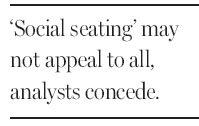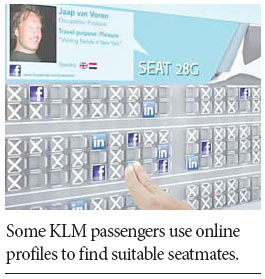Friendlier skies via social media
Updated: 2012-04-08 07:49
By Nicola Clark(The New York Times)
|
|||||||
PARIS -The Dutch airline KLM has begun testing a program it calls Meet and Seat, allowing ticket-holders to upload details from their Facebook or LinkedIn profiles and use the data to choose seatmates.
"For at least 10 years, there has been this question about serendipity and whether you could improve the chances of meeting someone interesting onboard," said Erik Varwijk, a managing director in charge of passenger business at KLM. "But the technology just wasn't available."
With Facebook alone claiming nearly 500 million daily active users - more than 60 times the eight million people who fly each day - KLM and other airlines are betting that many of them would be willing to share their profiles in exchange for a chance to meet someone with a common interest or who might be going to the same event.

Last year, Malaysia Airlines introduced MHBuddy, an application that allows users who book and check in via the carrier's Facebook page to see whether any of their "friends" will be on the same flight or in their destination city at the same time. The platform, which claims 3,000 monthly active users, also enables existing friends to select seats together.
And airlines are not the only ones betting on the concept.
Planely, a Danish start-up, allows registered users who submit their itineraries to view the Facebook and LinkedIn profiles of others who will be on flights with them. Since it began in late 2010, Planely has connected more than 1,500 travelers, according to its chief executive, Nick Martin.
Satisfly, based in Hong Kong, allows users to submit profile information as well as their flight "moods" - whether they would prefer to talk shop or chat casually - and other details like languages spoken and preferences about potential seatmates. The information is then shared with its airline partners.
KLM's service is available only to travelers with confirmed reservations. After selecting the amount of personal information they wish to share, passengers are presented with seat maps that show where others who have also shared their profiles are seated. You can then reserve the seat next to anyone who seems interesting and that person will receive a message with your profile details.
While it is not possible to "reject" a person who has chosen to sit with you, you can select another seat as long as two days before the flight.
Dan Nainan, a comedian from New York, said he was eager to try it out. "If people are able to choose whom they sit next to, they're more than likely going to be friendly and outgoing and easy to talk to," said Mr. Nainan, 30.
But Kaamna Bhojwani-Dhawan, the founder of a Web site for parents traveling with young children, said she found the trend "puzzling."
"My goal is to get through the flight without losing my mind - or either of my children," said Ms. Bhojwani-Dhawan, 32. "I can't imagine being very good company, nor am I particularly interested in sitting next to another mom with kids so that we can compare notes."

Analysts conceded that "social seating" was likely to appeal more to business travelers en route to trade shows, or backpackers looking for travel companions - although even those situations have pitfalls.
"Pity the poor venture capitalist who gets seated with the start-up guy who talks his ear off," said Jeff Jarvis, whose book "Public Parts" concerns engaging with people online.
Mr. Varwijk of KLM said his airline was not yet actively promoting the seating program, which is being offered initially only on flights between Amsterdam and New York and San Francisco and Sao Paulo. Only about 200 passengers have participated so far, he said, but barring any major problems, the airline hopes to roll out the service - which can be arranged from 48 hours to 90 days in advance of a flight - on all of its intercontinental flights by the spring.
"KLM really sees social media as a way to tap into a different part of their customers' lives," said Henry H. Harteveldt, a travel industry analyst. Some airlines are taking the opposite tack and catering to passengers who just want to buckle up and be left alone.
For fees of $6 to $60, Air New Zealand, AirAsia X in Malaysia and Vueling in Spain, for example, let passengers request empty seats next to theirs. If a flight turns out to be full, the extra charge is refunded.
The New York Times
(China Daily 04/08/2012 page11)